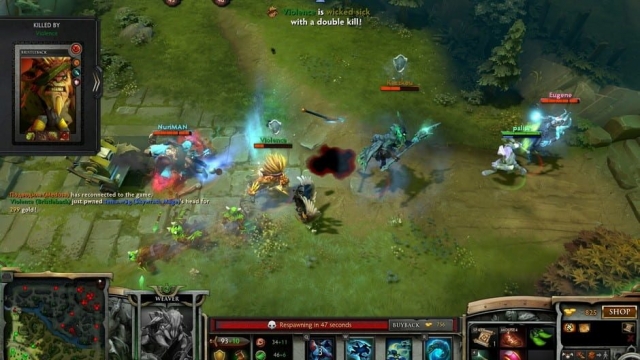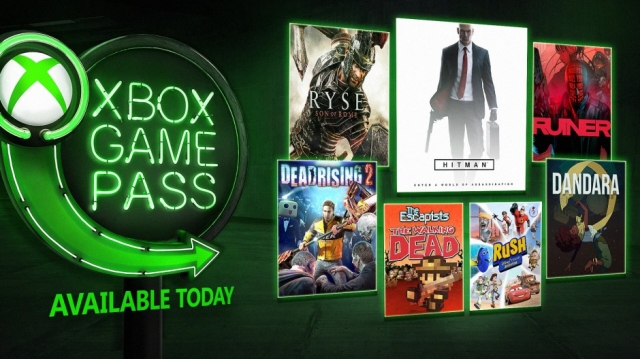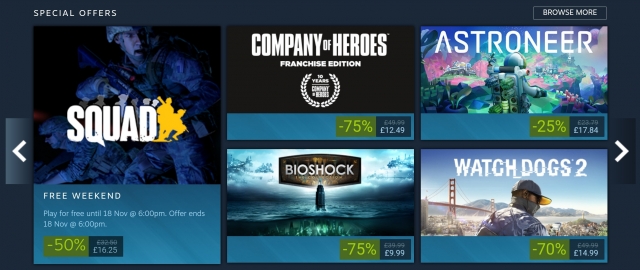
Name Your Price - The Changing Value of Games in Today's Murky Market
Oh to be back in simpler times, when Freddos cost mere pennies; a third BBC channel was a wild, unnecessary fantasy; and the word “Brexit” held no power over anyone at all. In those halcyon days, gaming too was a simpler affair; you could rent games, or else buy them outright. No licences, no small print and no alternate pricing models — not like in today’s market. Anyone attempting to traverse the obstacle course of subscription services, free-to-play titles, digital rights laws and dubiously legal discounts is bound to ask themselves if a full price videogame is worth paying for any more, and it’s easy to see why. As games grow more complex, the process of gaining access to them grows more complex too. Now, the simplest, cash-in-hand way of buying games seems —to the average consumer— to be the most expensive and therefore least appealing. What are all these alternative business models doing to the perceived value of a full priced game? And what, if anything, can be done to help restore that value in the public eye?
Free-to-Play
The biggest and most enduring titles in the world are free; people spend hundreds, if not thousands of hours in games like DOTA 2, Fortnite and Counter-Strike: Global Offensive with no upfront cost. From a sheer cost per-hour perspective, there’s no competing with that while staying within the boundaries of the law. Thankfully, free-to-play games tend to lean on the Esports side of the market, which means they offer a different kind of experience to traditional gaming and therefore monetise differently. In the same way that it costs nothing to play a game of football, it costs nothing to play a game of DOTA 2, and yet there are enough things to sell at the periphery of either game to justify an entire industry around both of them.

That's right, I'm comparing this to football.
For a player who devotes themselves largely to an annual game, whether that be Call of Duty, Battlefield, FIFA or anything else, free-to-play is incredibly appealing. Not only can that player’s entire gaming group converge on a single title without any financial barriers, but there’ll also be no yearly loss of progress and resulting sense of futility that comes with moving from one yearly instalment to the next. Call of Duty, the golden annual franchise of years past, has undoubtedly been robbed of sales by games like Fortnite or Apex Legends. Sure, this year’s Modern Warfare stands to receive a bump in sales over previous years by virtue of name recognition and nostalgia, but that isn’t sustainable; next year’s sales could well see the franchise return to that Black Ops 4 slump.
Thankfully, there are a couple of significant factors which should let free-to-play games coexist with their traditional counterparts in the market. Firstly, they offer such a wildly different kind of experience to the vast majority of paid games that free-to-players (patent pending) who do want some painstakingly crafted gameplay and story won’t be able to find it in abundance without paying for a full game. In addition to this, there are customers (like myself) for whom the idea of being hamstrung within the game or never having a “complete” experience sours them entirely on free-to-play. Many games avoid being too egregious with how they incentivise in-game purchases, admittedly, but those monetisation “hooks” can still be a real turn off.
Game Subscription Services
As a culture, we’re speeding down a road where entertainment as a whole ceases to be a product, but a service to subscribe to. Spotify popularised the idea for music, Netflix for TV and now all the major players in gaming are competing for the largest slice of subscription pie. As it stands, Xbox Game Pass is the current leader, and so I’ll continue with that service as the point of analysis for the next few minutes.
£96 doesn’t necessarily get a customer two full price games, but it does get them a year of basic Game Pass. For the right kind of gamer, that is, one who likes checking out a variety of titles and has an interest in gaming as a whole, Game Pass is a deal that’s hard to refuse. What though, does it mean for the games not included in the subscription? Surely the bargain of Game Pass —£8 per month for 100s of titles— makes it harder to justify spending £50 on a new release, or even buying any game at all. We’ve seen it for music, films and TV; regular customers can’t justify shelling out for CDs, Blu-rays or box-sets when their respective subscription services offer such better value for money.

Now, I refer to Game Pass as if it were the only option for subscription gaming, that couldn't be further from the truth. In fact, the growing number of competing services threatens to unravel the entire business model for every company. With a new service entering the fray every few months, from EA Access, PS Now and Game Pass; to Apple Arcade and UPlay+, it becomes a lot more confusing, more expensive and a lot less appealing to keep up with everything. The titles that any single person may want to play are spread out over so many services that it seems pointless to subscribe to any of them; the business model may burn itself out by inundating the customer with choice and asking them to spread their funds in too many directions.
Discounts
“I’ll wait for a sale”. How many times have you said or heard this phrase uttered regarding a newly released game? There’s nothing wrong with it, money’s tight for a lot of us and £50 is a lot to spend on something non-essential. However, there’s a trend that sees the majority of games to drop in value remarkably quickly following release. Take Gears 5 for example, right now the game is just under two months old, and a quick google search turns up a sealed copy for £29.99. That’s a 40% discount for a short two-month wait. Any individual game’s price (except for in the case of Nintendo’s releases) is near enough in constant decline, which means that for many customers, a game may as well not be released until it hits a certain price point.
Again, I’m not condemning this mindset at all. Customers shouldn’t have any obligation to buy a game at full price if they can’t justify it. It’s certainly an interesting fact of the industry though, and one that publishers will no doubt accommodate for in how they assign budgets and make business decisions. A large quantity of players will never pay full price for a game when sales and price reductions are always so close. This aspect of the market has been reinforced by digital store sales, used game retailers and the sleazy online “grey markets” maintained by online store fronts like G2A. It’s true that if a higher percentage of customers bought new releases at their initial price point, games would make more money which could go on to fund improved successors. With that said, it’s the nature of business that prices fluctuate to meet demand, and it just so happens there is no demand for a full price game to a sizeable chunk of the customer base.

Not pictured: The base Company of Heroes 2 game is completely free as part of this sale.
I see no way for the industry to fight back against this, short of artificially keeping prices high —a terrible idea, as if it needed saying. Not only that, but I wouldn’t want to see the industry fight back against game sales; gaming can be an affordable hobby for the patient, and game sales are a huge part of that. While it can be sad to see beloved titles being devalued to the extent that they’re practically given way —the Epic Games Store, Humble Store and Twitch Prime are all known for their giveaways— it does mean that games can get in the hands of a massive and diverse range of people. In the long run, cheap and free games are bound to help the industry in the long run.
Final Thoughts
Like all entertainment industries, gaming is experimenting with new business practises to survive in the 21st century. Unfortunately, game publishers have more opportunities to experiment than movie studios, TV networks or record labels by virtue of longevity and interactivity of games. For us players, that makes for a turbulent time full of half thought-out business ideas, microtransactions and subscription schemes. Eventually, I’m confident that the ground will settle and things will reach an equilibrium, it’s just a matter of time. For now, just hold on and keep your wits about you, the game industry can be a confusing place.
Header image supplied by: unsplash.com/@belart84








COMMENTS